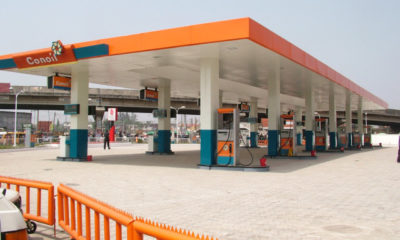- Fuel Subsidy Removal Will Reduce Fiscal Burden by 8%
As the debate over fuel subsidy removal rages on, the latest economic bulletin of Financial Derivatives Limited has revealed that the country’s fiscal burden will reduce by eight per cent if it stops subsidising petrol.
The federal government had Thursday said it was yet to devise a workable formula for the removal of fuel subsidy.
Minister of Finance, Mrs. Zainab Ahmed, who said this, added that the removal of subsidy would have negative effect on vulnerable Nigerians.
She said this few days after the International Monetary Fund (IMF) had advised Nigeria to remove fuel subsidy and channel the funds spent on subsidy to the health and education sectors.
The Minister of State for Petroleum, Dr. Ibe Kachikwu, recently disclosed that the landing cost of petrol was N180 per litre and the amount spent on subsidy daily was put at N1.86 billion.
But the Lagos-based financial advisory and investment firm in the report stressed that although subsidy removal was not without its costs, the potential benefit far outweighs its cost.
It stated that subsidy savings could be utilised in the provision of essential social needs such as access to free education and quality healthcare services.
These services, according to the report, are crucial to the improvement of living standard and the quality of life of the average Nigerian.
It stated: “More importantly is the reduction in the fiscal burden by at least eight per cent. Economic prudence, which emphasises the need to be discerning and forward-looking, has been the clamour for pro-subsidy advocates like the IMF.
“The fund is now sounding like a broken record on the call for the removal of subsidies. In the last three decades, it has become a vicious cycle – IMF recommendation on subsidy removal, followed by fuel queues, adjustment and in some cases the IMF is ignored and then intended and unintended consequences that follow.”
Nevertheless, while it reiterated that subsidy was not disdained in itself, it noted that its abuse and inefficient administration of the incentive, “has made it a fraud that must be checked.”
The Petroleum Products Pricing Regulatory Agency (PPPRA) had disclosed that Nigeria’s daily consumption increased by two million litres to 56 million litres in 2019.
This was a 22 per cent surge over 2017 daily consumption of 46 million litres.
This increase, according to the report, was largely not in line with “our consumption pattern during the time.”
“There has been a drastic decline in the importation of new cars over the period due to high import duties and levies. “Similarly, the increased traction of diesel engine vehicles and other modes of transportation such as air, water and rail, also do not support the supposed rapid growth in daily fuel consumption.
“Another bane of fuel subsidy is the arbitrage and smuggling opportunities across national borders. This means the Nigerian government is indirectly subsidising the petrol consumption of some neighbouring countries and it could justify the increase in consumption over the last three years,” it added.
Furthermore, the report noted that the impending expenditure cut from the removal of fuel subsidies would free up resources to embark on other social safety nets. But, it pointed out that the fact that there are no guarantees that these savings would be used to improve the quality of life of the economically vulnerable affects the case for subsidy removal.
“Reduction of other subsidies will aid fiscal consolidation. Fuel subsidy is not the only item that needs to be priced efficiently.
“The government also needs to allow for efficient resource allocation in the power sector and foreign exchange market. “Resource allocation through the interplay of market forces (demand and supply) limits market distortions. The adoption of cost reflective electricity tariffs will help address the power sector’s liquidity issues, improve the capacity of players across the power value chain and eventually output.
“Similarly, the gradual convergence of exchange rates will also ease pressure on external reserves, improve transparency and bolster confidence in the forex market.
“The reality is that petrol subsidies are being abused and ripping off the people who are the victims of inefficiency and fraud.
“Therefore, it is necessary to change the template and tie it to parameters – mainly the price of crude oil, the exchange rate and other costs metrics,” it added.

 Billionaire Watch3 weeks ago
Billionaire Watch3 weeks ago
 Startups4 weeks ago
Startups4 weeks ago
 News4 weeks ago
News4 weeks ago
 News4 weeks ago
News4 weeks ago
 Bitcoin4 weeks ago
Bitcoin4 weeks ago
 Naira4 weeks ago
Naira4 weeks ago
 Forex3 weeks ago
Forex3 weeks ago
 Treasury Bills4 weeks ago
Treasury Bills4 weeks ago





















